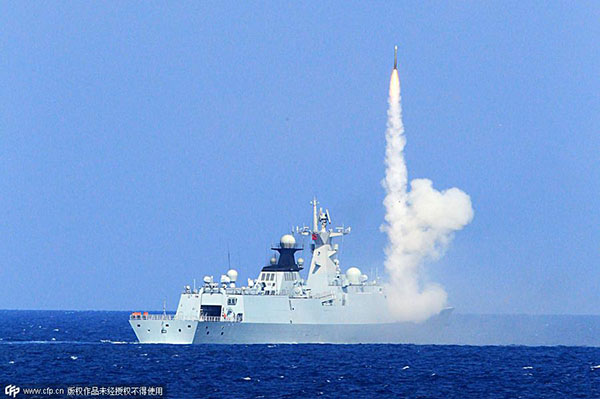Dispelling the myth of an expansionist China
By Chua Chin Leng (chinadaily.com.cn) Updated: 2015-11-13 17:48
|
 |
|
A missile is fired during a Chinese navy drill in South China Sea, July 28, 2015. The ongoing drill is part of the annual exercises, Chinese navy spokespersonLiang Yang said on Saturday, playing down "excessive interpretations." Liang said that such a drill is in line with international laws and practices, and the navy will continue to hold similar drills in the future. [Photo/CFP] |
The world has been misled into believing that China is an ambitious and expansionist country coveting the land of neighboring states. This myth has been hyped by the western media for several decades so that the undiscerning now accept this view uncritically without bothering to confirm if it is true.
The South China Sea territorial disputes have been used by superficial academics or those with an agenda as proof that China is indeed expansionist. Without understanding the facts, many have been gullible to accept the disputes in the South China Sea as the proof they needed that China is claiming the islands of the counter claiming parties. The truth is that these countries are claiming islands that China has claimed long before these countries were formerd and were recognized as countries.
|
 |
|
Chua Chin Leng [Photo provided to chinadaily.com.cn] |
It could have stayed on, on the same false pretenses the Americans used to continue to station troops in South Korea. More than 60 years after the Korean War, the American troops are still in South Korea and will not leave.
A similar situation existed in the Sino-Indian border conflict of 1962. Chinese troops were deep into India and could have stayed on the newly occupied land. However, China did not want any Indian territories.. They had all the excuses to stay and stake their claims. They withdrew completely out of the Indian lands it had conquered during the conflict. Why would an expansionist country with designs on its neighbor’s land voluntarily return the land it had fought for and won?
The third incident was the border war with Vietnam. The Chinese troops marched deep into Vietnam and could have sat on Vietnamese land with the Vietnamese looking lost and frustrated by the Chinese presence but unable to do anything. An expansionist country would have done just that. Again the Chinese troops withdrew back into China and allowed Vietnam to move back to the border with China.
In all three incidents, China could have taken advantage of the conflicts to seize the territories of its neighbors. Why not, since Chinese troops were occupying the disputed lands? So, is China expansionist when it could hold on to the territories the defeated neighboring states had lost? Since the end of the wars, China has not given trouble to its neighbors on their borders. Why then is China being accused of being expansionist?
Ask the North Koreans, the Indians and the Vietnamese for proof that China is coveting the land at their borders. Ask the rest of the 17 countries with borders with China if China has been attempting to seize their lands. Many of the 17 neighboring states of China were small and militarily weak and would not be able to resist a land grabbing China. No, they all live peacefully with China with no violation of their territories.
The author, Chua Chin Leng, is a political observer from Singapore.











